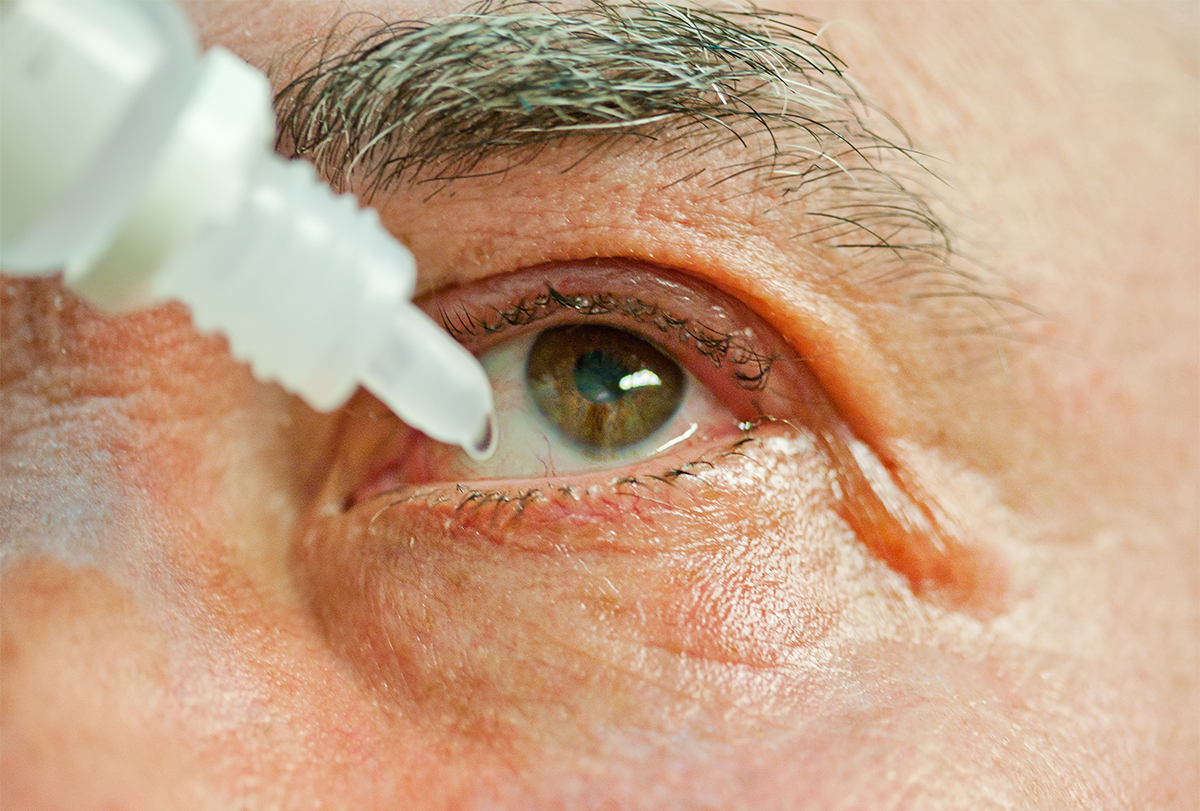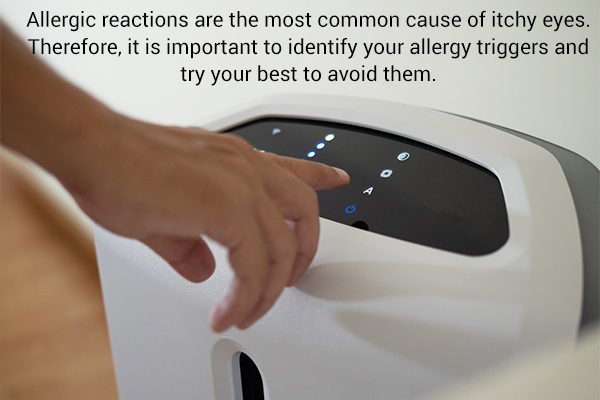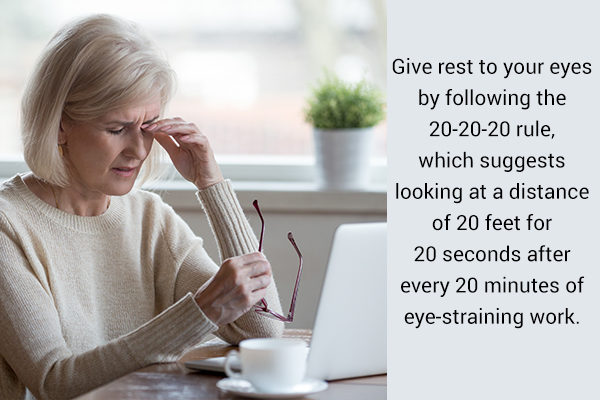In this article:
Everyone experiences itchiness in the eyes at least once in their lifetime. This ocular discomfort is often a symptom of an underlying problem, rather than a condition itself.

Itchiness in the eyes often creates an urge to rub the eyes and is a constant source of irritation and discomfort. However, excessive rubbing can damage the cornea and make your problem worse. Thus, it is imperative that you seek timely treatment for this condition before you incur any additional harm.
The most commonly used medications for itchy eyes are antihistamines, saline eye drops, corticosteroids, mast-cell stabilizers, and nonsteroidal anti-inflammatory drugs (NSAIDs), some of which have been associated with adverse side effects.
Thus, you must use them as prescribed and go for regular follow-up checkups to prevent complications. In addition to medical treatment, a few non-medicinal interventions can help relieve and prevent itchy eyes.
Home Remedies to Manage Itchy Eyes
Here are a few measures that can help minimize eye itchiness.
1. Apply a cold compress
Applying a cold compress over your eyes is a safe, inexpensive and easy to use remedy to relieve an itch or irritation in the eyes. In fact, this therapy is often recommended by doctors as well.
The cooling effect helps bring down inflammation and numb the discomfort for a while, and repeated applications can help resolve the problem for good. Using a wet compress offers the added benefit of hydrating your eyes, thus reducing the irritation caused by dryness.
There are various types of cold compresses you can make and use at home:
- You can apply a cold, moist washcloth over your eyes to control the itch caused by allergies.
- You can soak a clean cotton ball in cold milk or rose water, and gently massage it over your closed eyelids.
- Cut a properly washed potato or cucumber into small slices, refrigerate them for 15–20 minutes, and then place one slice over each of your closed eyelids. Once the slice has lost all its cold, replace it with a fresh slice from the fridge and repeat this at least 4 times.
- Yet another cold compress that has become very popular among general users for relieving eye irritation is a cold tea bag, but there is no scientific backing to confirm its efficacy. You can take a used green or black tea bags, or soak fresh ones in water and then refrigerate them for 15–20 minutes. Then, gently press the cold tea bags over your eyelids, but make sure to keep your eyes tightly shut all the while so that the tea liquid doesn’t trickle in.
Caution: Different kinds of compress may suit different forms of eye irritation, so it is recommended that you ask your doctor about the most suitable option for your particular case. Discontinue the application if you notice any signs of an allergic reaction or if your discomfort worsens.
A cold compress can help soothe your dry, irritated and itchy eyes by imparting moisture and bringing down the underlying inflammation.
2. Use O-T-C artificial tears
Many a times, the itching and irritation in your eyes is due to a lack of tear formation which causes dryness.
In such a case, you can use chemical-free artificial tear drops to lubricate your eyes. These are generally safe to use and are available without a prescription at any local pharmacy.
Follow the instructions that come with the product to avoid any side effects, and store them as prescribed on the bottle.
Note: It is completely normal to experience a bit of tingling when you first administer the drops but stop the use if you develop blurred vision, breathing problems, or increased eye discomfort.
Always read the ingredient list before buying the product to make sure it does not contain chemical preservatives or anything else you might be allergic to.
Artificial tears that come in the form of eye drops can help hydrate your dry eyes and bring down the underlying inflammation to relieve itchy eyes.
3. Use a humidifier
Living in an arid environment can suck the moisture out of your skin and can lead to the onset of atopic dermatitis. The dryness is often particularly intense around the eyes because the skin in this area is extra thin and sensitive.
The flaky skin around the eyes can become extremely itchy and irritated if not treated properly. One simple way to get rid of this problem or at least reduce its severity is by installing a humidifier in your home, particularly the room where you spend most of your time in.
This device can release moisture in your living space, which can help hydrate your skin as well.
Self-Care and Lifestyle Tips
Here are few do’s and don’ts to comfort your itchy eyes:
1. Avoid allergens

Allergic reactions are the most common cause of itchy eyes. Therefore, it is important to identify the factors that trigger your allergies and avoid contact with them. Eye irritants include pollen, wind, cigarette smoke, dry air, chemicals, dust, strong odors, and prolonged screen time.
Blinking often can help lubricate your eyes and remove any allergens or irritants. You can also take the following steps to limit exposure to allergens:
- Avoid going outside during periods with a high pollen count (generally mid-morning or early evening).
- Use an air purifier indoors.
- Shut the windows of your car and home to prevent the entry of allergens. Use air conditioners.
- Utilize allergen-impermeable covers for your comforters, pillows, seat cushions, and mattresses to help avoid dust mites.
- Occasionally expose your bedding to sunlight and replace old bedding with new ones to control dust mites.
- Wear wraparound sunglasses and a wide-brimmed hat to prevent pollen from entering your eyes.
2. Refrain from rubbing your eyes
Rubbing your eyes can aggravate the eye itchiness, regardless of the cause, and can even lead to damage. For example, rubbing an itchy eye caused by a foreign particle in the eye, such as makeup debris or an eyelash, can result in a scratched cornea.
3. Maintain proper hygiene when using contact lenses
When using contact lenses, it is vital to rinse them properly before using or storing to remove any allergens or irritants from the surface. Avoid prolonged use of contact lenses, and clean them daily. Replace the solution in the container frequently.
Refrain from sharing your lenses or eye makeup with other people. Occasionally, switch to using your glasses for a few days to give rest to your eyes.
How to Prevent Itchy Eyes

The following lifestyle changes can help prevent the development of itchy eyes:
- Avoid long stretches of work. Give rest to your eyes by following the 20-20-20 rule, which suggests looking at a distance of 20 feet for 20 seconds for every 20 minutes of eye-straining work.
- Wash your pillowcases and bedsheets using hot water and detergent to remove the allergens.
- Protect your eyes from air coming out of hairdryers, air conditioners, fans, or car heaters.
- Mop your floors instead of sweeping to prevent stirring up allergens and other particles.
- Restrict your pets from entering the bedroom to avoid pet dander.
- Refrain from burning candles as they emit soot and irritants in the air. Scented candles can irritate the eyes.
- Do not smoke cigarettes or tobacco. Additionally, avoid exposure to any kind of smoke.
- Use hypoallergenic products near the eyes.
- Consider vitamin A and omega-3 supplements as they can help improve eye health. A deficiency of vitamin A can cause dryness, (1) and omega-3 is known to aid tear production. (2) However, consult a doctor before using them.
- Take your medications regularly during allergy season.
- Refrain from touching your eyes and face.
- Wash and clean your hands frequently.
Can Castor Oil Treat My Itchy Eyes?
It has been suggested that castor oil may work as an eye lubricant that can form a protective seal over your tear film and thereby prevent tear evaporation.
However, it has a relatively thick consistency as compared to other tear drops and can therefore feel heavy on the eyes. Moreover, this liquid is not as sterile as traditional eye drops which can invite eye infections and further irritation.
All in all, the cons outweigh the pros so it’s best to avoid using castor oil to relieve itchy eyes, especially if you are allergic to it. The medicated eye drops available over-the counter offer a far more convenient, safer, and sterile alternative.
Final Word
Multiple factors can cause itchy eyes, allergic reactions being the most common. Itchy eyes can also be the result of irritation on the eyelids or sometimes in the clear membrane of the eye. The doctor will prescribe the necessary treatment after determining the root cause of the itchiness.
Eye care measures and home therapies can not only enhance the effectiveness of your standard medication but can also promote quick recovery and prevent future episodes.

- Was this article helpful?
- YES, THANKS!NOT REALLY


